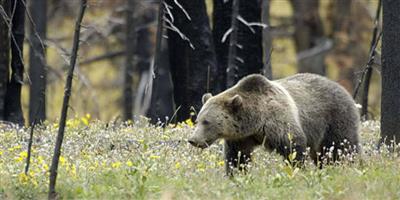With the grizzly bear numbers climbing and livestock predations reported to the Livestock Loss Board being the highest since the Department was instituted in 2009, ranchers are searching for relief.
Since reducing the number of grizzlies is not an option, the Marias River Livestock Association is partnering with USDA Wildlife Services and the Pondera Extension Office to bring the public some ways to perhaps deter livestock losses due to large predators, such as wolves and bears. On Nov. 2, 2015 from 8 a.m. to 4:30 p.m., the MRLA will co-host a Predator Damage Management Workshop at the Pondera Shooting Sports Complex, 972 Granite Rd., Conrad. No Pre-registration or fee is required and anyone can attend as it is open to the public. At the door registration will start at 8 a.m. and the Workshop will begin promptly at 8:30 a.m. Lunch and snacks will be provided by Marias River Livestock Association.
While the planning for this workshop started last spring, the timing has coincidentally turned out to be excellent due to the increased bear conflicts this summer and fall due to the bear population spreading out onto the prairie. Ranchers living in the Northern Continental Divide Ecosystem, which is made up of 17 counties including Glacier, Teton and Pondera, have seen an increase of bear activities, but even areas outside of the Ecosystem recovery zone such as Toole, Liberty, and Cascade counties have had increased spotting of bears and some depredation of livestock.
“Reports of bear conflicts have been filling the newspapers lately,” Valier rancher Trina Jo Bradley said. “People have been injured and killed, and livestock losses are incomprehensible. Unfortunately, the current bear management system is not working. It's time for us as ranchers, farmers, parents, and the public to take a stand and make sure our lives and livelihoods are not under constant threat.” Bradley was referring to the hiker that was killed and partially eaten in Yellowstone National Park, the woman from Kalispell that was injured in her home and later died at the hospital, and the most recent mauling of a young man in the Blackleaf.
“This will be a great educational opportunity for producers. There will be presenters who have dealt with the bear versus livestock issue for years and they can share how they have been coping with the situation. They are all willing to help find solutions for your ranch,” Maggie Nutter, MRLA President, said. “As frustrating as it is to have to deal with predators, the reality is that the bears and wolves are here. Just like coyotes, we need to learn how to protect our livestock from them. I don’t think it should end there though. We need to look for constructive ways to encourage better management by the governmental agencies, but that will be a whole different topic and meeting at a later date.”
After repeatedly dealing with bears in the feedlot he manages, Cody Yeager of Choteau held a gathering at the Choteau High School earlier this month with 186 people signing in.
“I held the meeting because I wanted to see if other people felt like I did about the bears – that something needed to be done,” Yeager stated. “There was a wide range of opinions, but the majority felt that the bears needed better management.”
Don't miss the Predator Damage Management Workshop Monday, Nov. 2 at 8 a.m. at the Conrad Shooting Sports Complex. For more information, contact Nutter at (406) 937-2751.
Predator Damage Management Workshop Agenda
November 2, 2015 – Pondera Shooting Sports Complex, 972 Granite Road, Conrad, Montana
Workshop Objective
To provide information on the science behind non-lethal methods & the practical applications of various non-lethal methods integrated into predator damage management strategies to protect livestock & other property. Discuss the importance of the non-lethal component of managing predator damage as it relates to resource owners being able to be proactive in managing predation.
8:00 – 8:30 Sign-in for Meeting (no registration fee)
8:30 – 8:45 Welcome/Opening Remarks – Maggie Nutter, President, Marias River Livestock Association
8:45-9:00 Agenda Review & Introductions – John Steuber, State Director/Supervisory Wildlife Biologist, USDA/APHIS/Wildlife Services, Billings, MT
9:00 – 9:30 “Who’s in charge Here? Identifying Roles in Dealing With Predator Conflicts” – Michael Marlow, Resource Management Specialist, USDA/APHIS/Wildlife Services, Fort Collins, CO
9:30 – 10:15 “When and How to Use Non-Lethal Tools” – Dr. Julie Young, Supervisory Research Wildlife Biologist, USDA/APHIS/Wildlife Services/National Wildlife Research Center, Logan, UT
10:15 – 10:30 Break (refreshments provided by the Marias River Livestock Association
10:30 – 12:00 “Bears, Wolves, People and Agriculture: Conflict Reduction Initiatives in Southwest Alberta” – Jeff Becktell, Coordinator, Carnivore & Communities Program, Waterton Biosphere Reserve Association, Cardston, Alberta
12:00-1:00 Lunch (lunch provided by the Marias River Livestock Association
1:00 – 1:30 “Does Carcass Management Have a Place & Benefit Here?” – Kris Inman, Community Partnerships Representative, Wildlife Conservation Society
1:30 – 2:00 “Electric Fence Incentive/Cost Share Program” – Russ Talmo, Rockies & Plains Field Technician, Defenders of Wildlife, Missoula, MT & John & LeAnne Hayne, Rancher, Dupuyer, MT
2:00 – 2:30 Montana Livestock Loss Board Programs: Reimbursement and Grants” – George Edwards, Executive Secretary, Montana Livestock Loss Board, Helena, MT
2:30 – 2:45 Break (refreshments provided by the Marias River Livestock Association)
2:45 – 3:15 “Current Grizzly Bear Population Status, Conflicts, & Activity on the Northern Rocky Mountain Front. Discussion of Non-lethal Methods” – Mike Madel, Grizzly Bear Specialist, MT Fish, Wildlife & Parks, Choteau, MT
Source: Marias River Livestock Association






